by Azzurra Immediato
_
What is a border, really? A barrier, a protection, a multiple symbol of affirmation? Is it a limit? Something not to overcome? A fortification? The paradigm of an exclusion? And why there is always the idea of clash, of war in connection with the concepts of limit and border? Even when the terms of anthropological dynamics would predict development, expansion, growth? We have always been forced to think that beyond every border there is the unknown, a dimension not yet conquered – rather than not yet discovered – and if it is true that humankind discover in order to acquire, here is that every place on Earth – and beyond – is destined to enter the expansionist aims of humanity, a rather narrow collective self, that, at the same time, unites and distances a demarcation decreeing a relationship of belonging and exclusion between its internal and external elements.
If this is not the place to build a historical and geopolitical analysis – which we leave to the experts or to media – certainly Photolux Magazine can try to cast a glance on what happens and has happened in the East, in Ukraine and in neighboring countries, where photographers and reporters drew a map of images of the upheaval that appeared as a short circuit in the perimeter of the geographical boundaries of the 90s.
We asked some of them to tell what they saw through a single shot. One Shot. A significant shot, which had a special value within their investigation and that could show us, in the safety of our homes, what we can’t understand, see, observe, read about this war.
Caimi & Piccinni – Jean-Marc Caimi and Valentina Piccinni – Simone Cargnoni, Francesco Faraci, Francesco Malavolta and Alessandro Penso are the protagonists of this tale from the border, with their own language, their own grammar and the freedom to express a thought that can help us to understand the photographs they shared. A complex itinerary that does not have the ambition of an interview but is a choral diary in which visions and perceptions are innervated in a history so in fieri as to appear incomprehensible, distant, but frighteningly close.
What did they see that we couldn’t see?
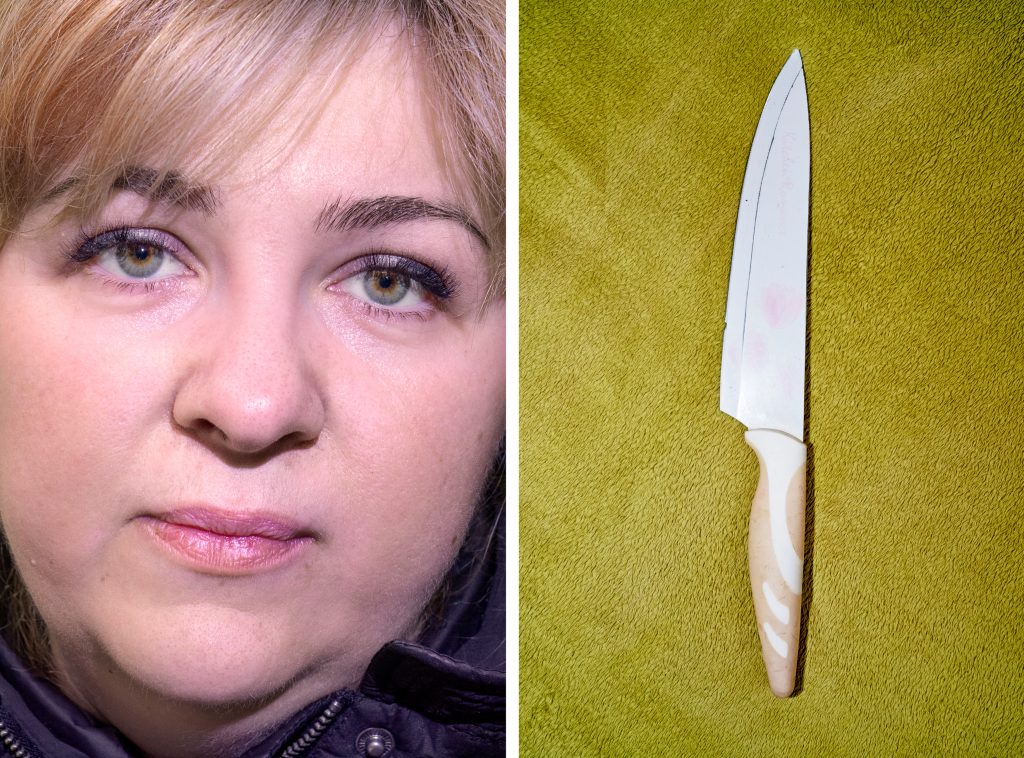
Caimi&Piccinni
What we cannot see is actually always in front of our eyes. It is the very story of each human being. Connecting and having a personal relationship of mutual trust with every single one of the subjects of the story we are telling is, for us, the key to get a complete picture, more accurate and without filters. Depersonalizing the stories, to tell just a general scenario, it would mean losing accuracy and the possibility of establishing a link between facts and public, essential for raising awareness. Wars, migrations, environmental catastrophes and religious issues are all events that change and shape the world, in which humans play a definitive and active role. The testimonies of each person have to be collected, as a symbol of the whole story and so close to our own life. During the massif exodus of people caused by the war in Ukraine, we have gathered the stories of women who fled the conflict that was bursting right at their doorstep. These women, often with their children, have found refuge just beyond the Polish border, after a long and life-threatening journey. Here we tell about Viktoria’s story, her portrait and the still-life of an object she brought with her when she left. This is just one of the many stories we have collected, but unique and symbolic like all the others that we have had the opportunity to document.
I was able to leave just in time. It is very complicated to get out of Ukraine, now. My neighbors told me that my home has been occupied by Russian soldiers. I ran under the bombs, so I couldn’t even take our documents. The only thing I got from home was a knife to protect me and my kids. When we decided to run away we went to get the car but it didn’t start. We were out of gas. We asked a neighbor for a ride and he accompanied us to Vasilkov where we slept one night at a friend’s house. But they started bombing there too, so we run away again, seven of us, plus a cat, in a car. We stayed in Bila Tserkva (140 km from Kyiv) for five days. We were in very bad conditions there, it was very cold without running water. We were in a semi-abandoned house in a small country village. I didn’t know anyone, but the villagers helped us as much as possible by bringing us potatoes and carrots. We collected wood in the forest to light a fire, otherwise we wouldn’t have made it through the nights. At this point our friends decided to go to the Carpathians, but we did not know anyone there, instead we were accompanied to Vilnizie. There we slept for two nights at my brother’s friend’s place. From there we took a train to Lviv. My mother was still in Kyiv, she eventually decided to join us with a friend, so we met in Lviv. We traveled from Vinizia to Lviv for eight hours on the train, without water, without food, without toilets. It was very hot. The children were crying. In Lviv we waited four hours before boarding the train to Przemysl in Poland. From Lviv to Przemysl it took nine hours by train, stopping many times, but the doors remained closed at all times. Once we got to the Polish station we had to wait in the train for another two hours. Look at these photos I took! It’s the butcher in my neighborhood on the 24th of February, the outbreak of the war. The shelves are completely empty, as the supermarkets were. This is the photo of the bombing I saw from my window and this is the photo of my neighbor’s house. They hit the building opposite of mine. From the information I received from people who stayed in my neighborhood, I known that Russian soldiers were confiscating cell phones from women. They also told me that the soldiers asked an old man to prepare food for them and when he refused they killed him. Now my children and I have decided to settle in Szczecin, Poland, where my godmother lives. It is also not very far from Ukraine. I am divorced but now I have a boyfriend. He is at war. In fact he’s been at war since 2014. Now he has been sent to Donetsk. We try to talk every day. He tells me of a lot of casualties. I know that every time we talk could be the last. My ex husband is Tunisian. He fled from Kyiv one day before the outbreak of the war. I never thought for a moment to join him there, in Tunisia. Even if we’re in good terms I don’t want to risk his family preventing me from bringing my children back to Ukraine once there. Who knows what might be going through their mind. While we were still in the house and then from the car, as we fled, we saw the bright trails of the missiles and the flashes of falling bombs. However, I try to protect my children from the news as much as possible. Of course, they are partially aware of what is happening. When we got to Lviv, I saw the wonder in their eyes. They saw folks who walked the streets, open shops near the train station, women in the streets wearing makeup… It felt like living again. Then when we got off at Przemysl station, here in Poland, they saw many soldiers and asked us if this really was a safe place or if there was war here too. I explained that these soldiers were here to take care of us. For me the the most important thing is to protect them.
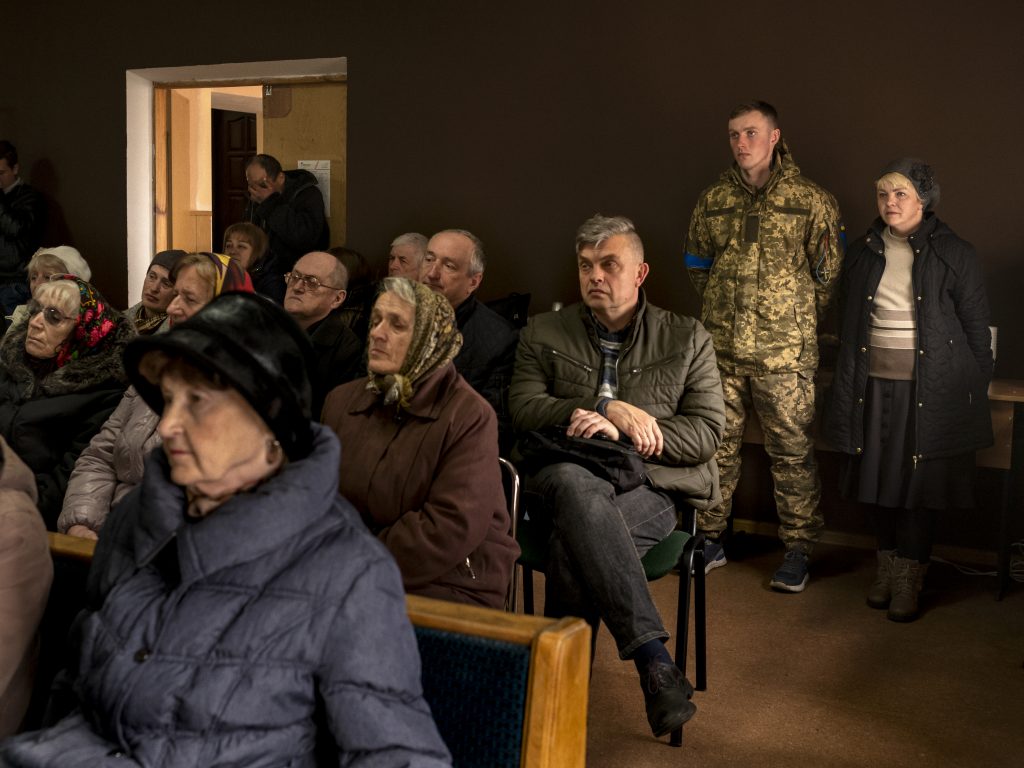
Simone Cargnoni
The think that touched me the most is how calm people are. I was in Korosten for a week, 140 km west of Kyiv and 50 km south of the border with Belarus. I got there on the thirtieth day of the war in a van with Julia, an Ukrainian girl who goes back and forth from Poland to her city to bring food, medicines and essential goods. When the conflict broke out, she left three of her four children safe in Poland, the fourth, aged 16, wanted to stay with his father in Korosten. Julia’s husband is a Baptist Pastor and manages the distribution of supplies in their city, through the church network. The town was not seriously bombed, since it is a strategic connection point from the north towards Kyiv. The calm I was talking about is the one of Julia telling me this story and the fact that there are many other women who, like her, have brought their children to Poland for then coming back with vans to bring food and medicines, both to civilians and to the military. I only understand later why this situation seemed so normal for her: she was already doing it before the outbreak of war, only not from Poland to Ukraine. She used to do it, along with other women of her parish, once a month from their city to the Donbass. I found the same calm, almost pragmatism, in everyone I met there, in the way they dealt with the sirens that warn of a possible bombing: if you are not doing anything you move to a shelter, if you are doing something you keep doing what you are doing. I saw elderly people continue shopping because the supermarket had been closed for three weeks and they wanted to take the time to choose their groceries. I saw teenagers playing basketball and not even flinch at the sound of the sirens. I saw about 30 women and men gather in the central square of the city to pray for the end of the war and they just raise their voice a little more over the sound of the sirens even if they stood in a circle in one open square, during the day, clearly visible. To be fair, they didn’t pray for the end of war itself but for the victory of Ukraine. I have also seen what I call ‘calm’ in many military volunteers, especially young people in their early twenties, who seem to have entered a state of mind where they perform their military duties as if it were a shift of any job they did before. Then when they can, they go home and do normal things; like Sasha, the volunteer army soldier portrayed in the photograph, who joined his mother to attend Mass together in the Baptist Church of Korosten, on a Sunday morning. After Mass, he went back out of town to guard one of the many checkpoints located along the streets.
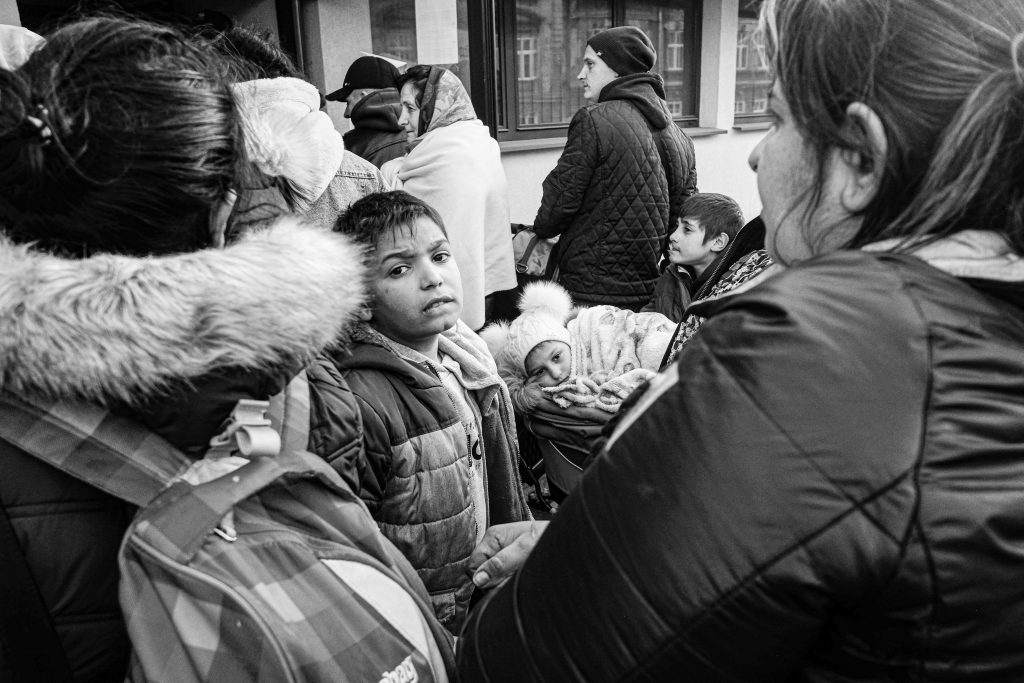
Francesco Faraci
[from the diary that Francesco Faraci wrote in the days he was on the border between Ukraine and Poland]
Prezmysl station. […] From here, as the days pass, they are sorted into welcome centers of Krakow, Katowice, Warsaw. A coming and going that never stops, in the chaos of an emergency that caught everyone off guard. Buses, coaches, even police vans arrive in the square of the local police station, full of women, children, elderly people who can barely stand. The station speaker recommends to pay close attention to the announcements because the trains do not follow the normal timetables. At passport control there are entire Romani and gypsies families. […] I have no clear perception of what really happens in that building detached from the core of the station, protected by a fence. Behind, however, there are two tracks. In the boards there’r no indication about trains, neither departing nor arriving. I approach the entrance manned by the military. They are young, their faces are ruddy because of the cold.
I ask what’s going on, why these people get so stirred. He smiles at me sarcastically – You don’t know what’s going on? For real? – he says alluding to the fact that the war is a stone’s throw from here.
– Yes of course – I reply, annoyed by that stupid arrogance. – But here, in this building? What is happening here? – I ask him.
– Do you see them? – He replies drawing an arc with the movement of an arm – These are going to be sent back.
I must have misunderstood. – Back? – I say – do they return to Ukraine? – He answers yes and he also seems pleased.
– They have no documents? –
– Yes, they have. Their documents are ok, but nobody wants THEM. –
Them, of course, are the gypsies. Where I see only women and children, only human beings who, like others, have the right to be rescued from the destruction of their identities and their lives while the military has the duty to help them; men in camouflage see nothing but gypsies, ugly and dirty as if this were a fault without redemption.
– What do you mean when you say that nobody wants them? –
– They are poor – he says – They do not want to work, they are dirty. –
– Why? What does it has to do with it? – I cannot shut up and accept this violence.
– Ask them, what do you want from me! –
– They are refugees like the others – I say – they are human beings too. –
He pretends not to hear. He looks at me with his cold eyes, with his stiff chest. He gestures to go.
Here is the other side of hospitality, I think.
Poland reveals itself for what it is, an extreme right wing country, which sees the devil in the different. It can’t be a coincidence that Polish government has repealed the law against abortion and homosexuals are considered evil. We are told that transgender people get stopped at the border and sent back because on their documents it says they are men and martial law in Ukraine establish that they remain in the country to fight. No to mention the gypsies who are persecuted for centuries. I join the queue, too. I look them in the eyes, there is only one man among them, in his sixties, he has a pair of glasses with black frame and tape on the temples. He wears a pair of corrective shoes and limps visibly. He stays silent in a corner, his face surrendered to the evidence of facts. He holds a little girl in his arms. I get closer, I caress her head and I instinctively give her a kiss. I have in front of me people who have lost everything, if ever they have possessed something, they no longer have it. Their home is what they take with them, now. An inhumane treatment. Yes, they receive aid from the humanitarian organizations, from the Caritas, but they are not allowed to stay inside the station, they cannot stay warm like the others. The temperature is -2 degrees. During the night it drops to -4. So many children. They approach me, they ask for a few coins, they want to touch the camera, they want me to take some shots. I please them, they smile, they pose. Children are children in all parts of the world. Not all of them, however. There are also those who, traumatized, have stopped talking, or even moving. They are in their mothers’ lap, with their gaze fixed on nothing. With all my anger, with all my love, every photograph I take turns into a cross to carry. The dignity, the strength of these people who suffer such an oppression, who suffer to be treated as second class refugees, almost like animals, leave me speechless. I would like to hug them one by one, wish them good luck or “lacio drom” (“have a good trip” in the Romani language), but I immediately realize that the only thing I can do is to tell what I am seeing, without filters, to give back that dignity which was taken away from them twice, first because of the war and again with this false hospitality. Minutes and hours go by. At a certain point the entrance doors of the building open wide. The Romani collect what they can, leaving a lot on the ground, they flock to the steps that separate them from the corridor. I put the camera back in my backpack and help them […] The only man in the whole group put his arm round my shoulders, plants his eyes into mine and gives me a hug. Our eyes fill with tears and then we get dragged by the flood of people until I can’t see him anymore. They will all come back, I tell myself. I feel powerless.
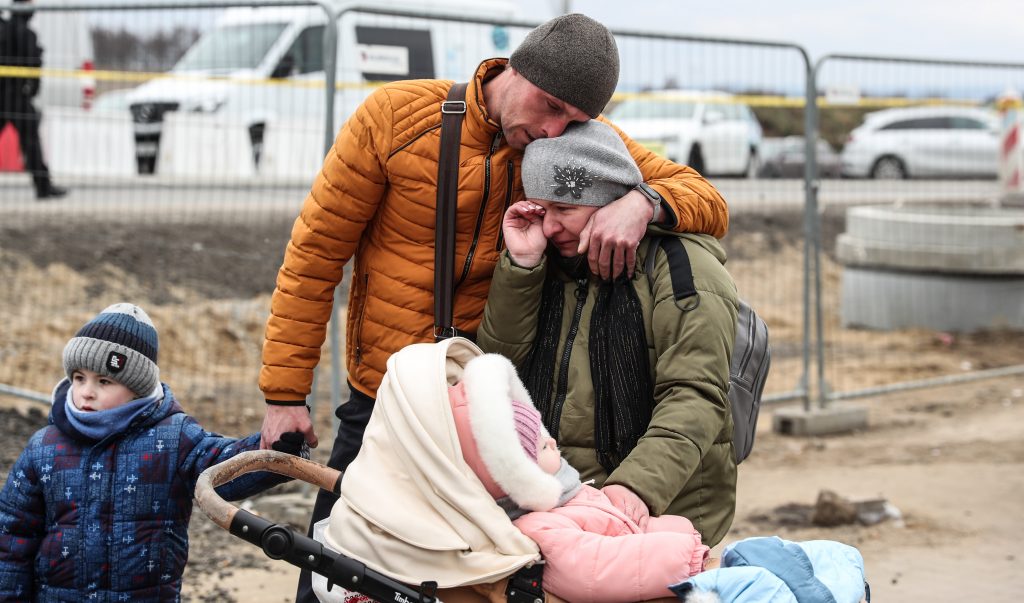
Francesco Malavolta
This is not the kind of photograph that photo editors are looking for for publications on magazines and newspapers right now, despite the fact that the images that arrive from Ukraine are consumed so quickly. I’m fine with that but it is not what I’m interested in, so that there’s even some “noise” in the background of this photograph… I found it very relevant to what I’ve worked on in these over 60 days, especially the flow of people who fled Ukraine towards the five neighboring countries that have welcomed them. I find this photograph perhaps one of the strongest I took there. These were the first four days of conflict, at the beginning of the war and I took the photograph at the border crossing in Medyka, Poland. We can see this man who had received permission to cross the border and enter Poland to bring his family to safety, to then say goodbye, kiss his wife and his two children, and return to Ukraine to fight (a procedure that just some days later became mandatory, but in the very first days of the war however, I believe it was not). So imagine a man who says goodbye to his loved ones to go back to fight with a 50% chance of surviving. This is something very complicated to understand and explain, and it’s what I try to tell this photograph.
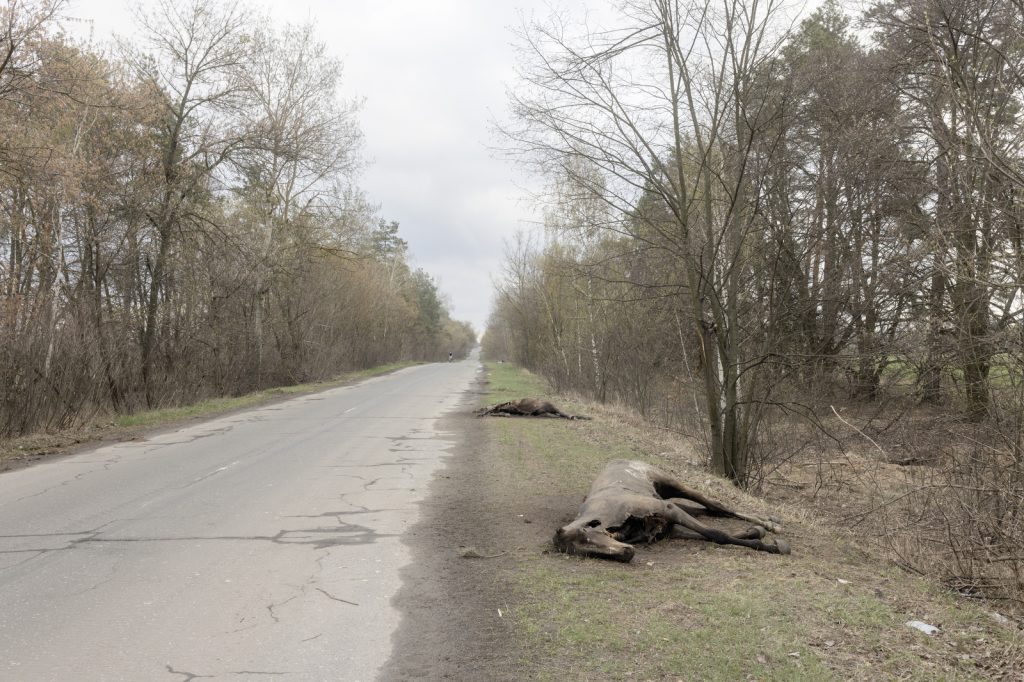
Alessandro Penso
The city of Hostemel was one of the first cities to be occupied by the Russians for the purpose of besieging the capital, Kyiv.
For weeks one of the toughest battles was fought there.
The citizens say that, during the Russian occupation, anyone who tried to escape from the city or from the villages was killed.
Every shot and single word by Caimi&Piccinni, Simone Cargnoni, Francesco Faraci, Francesco Malavolta and Alessandro Penso appears as a piece of an unspeakable geography jigsaw, in which borders, limits, barriers and distances take on a new value, distorted by historical processes that affect millions of defenseless people. In a such dangerous gamble and thanks to those who have lived and are experiencing the conflict, offering views, perceptions and words, we can understand that borders are not just a groove in the ground but deep abysses, into which mankind risks to fall. Since 2020 we have come to terms with our inner and physical geography, while the limit of the gaze widened or claustrophobically narrowed, until, immersed, powerless, in the immanence of a metaphor called ‘war’, surreal and shocking, something on the edge of Old Europe, magmatically, was about to subvert the pre-established order of the twentieth century.
The perspectives donated by the six photojournalists involved here, therefore, appear as a necessary crossing of borders, as a new land that becomes horizon and that we, in the safety of our homes, must learn to read, interpret, and understand.




